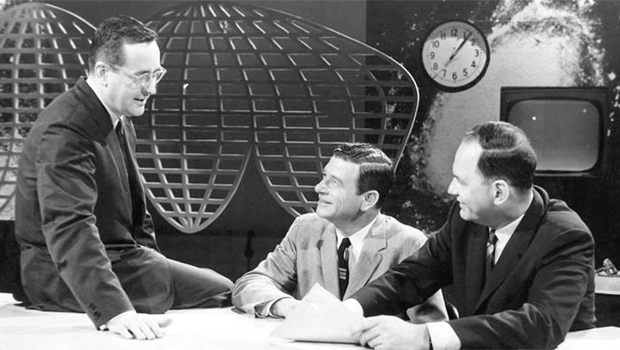John W. Chancellor

By Jordan Hillier
Today, Brian Williams is considered the epitome of the modern newsman/commentator. News legend John W. Chancellor (1927-1996) was the man to watch and the face of NBC’s Nightly News from 1970 until 1982. Chancellor represented American media across the globe. A foreign correspondent in Vienna, London, Moscow and Brussels, he kept the American public informed on the developing European Common Market.
Although he didn’t become a Princeton resident until his retirement from NBC in 1993, just three years before his death from cancer at the age of 68, he is well-remembered in the town as an active member of the community who spoke at the Princeton University Library, narrated Howard Blake’s The Snowman, and taped “A Walking Tour of Princeton.”
Born in Chicago, Chancellor embarked upon his career as a journalist and broadcaster at the age of 14, when, after a series of odd jobs as a riverboat deckhand and a chemical tester, he became an advertising copy runner for The Chicago Daily News. As his career developed, he rose from copy boy to writer at The Chicago Sun-Times.
Chancellor began formal studies at the University of Illinois but dropped out when he was offered a job tracking stories for NBC’s Chicago affiliate, WNBQ. Soon he was climbing the ranks and was promoted to network correspondent for the midwest.
One of his experiences, in Arkansas during the period of racial integration of the country’s schools, made a lasting impression on Chancellor. In September of 1957, lone black student Elizabeth Eckford approached Little Rock Central High School. Black students had been told to report to a different location, but Eckford had missed the announcement. As she entered the school grounds, she was jeered by a mob of white students. Chancellor watched a frightening scene unfold. Should he flee or should he stay? His response would characterize his future as a journalist covering stories he believed the public had a right to know about. He stayed.
Although, he briefly hosted The Today Show in the early 1960s, he found the popular light news format an uncomfortable fit for one who had earned a seat at the table with every American president since Eisenhower, not to mention numerous prime ministers and world leaders, including the top Israeli and Arab leaders of the day.
His fearlessness resulted in his arrest, at the 1964 Republican National Convention when he refused to cede his spot on the floor to supporters of presidential candidate Barry Goldwater. Not long afterwards, he was chosen by President Lyndon B. Johnson to direct the Voice of America program, which he did until 1967.
During the 1976 presidential election Chancellor came up with the idea of using red and blue colors as a way of representing Republican and Democrat state wins. In 1992, he was inducted into the Television Hall of Fame.
When he retired, the Overseas Press Club of America honored the respected journalist and author’s “distinguished and exemplary service…long-term dedication to presenting the news without theatrical embellishments used to turn the news into entertainment.”
In that same year, Chancellor moved to Princeton, where he died on July 12, 1996, a few days shy of his 69th birthday. He left a void in American media and a vision of what news and television should be. The John Chancellor Award for Excellence in Journalism, established in 1995 is presented by the Columbia University Graduate School of Journalism.


Comments ( 0 )